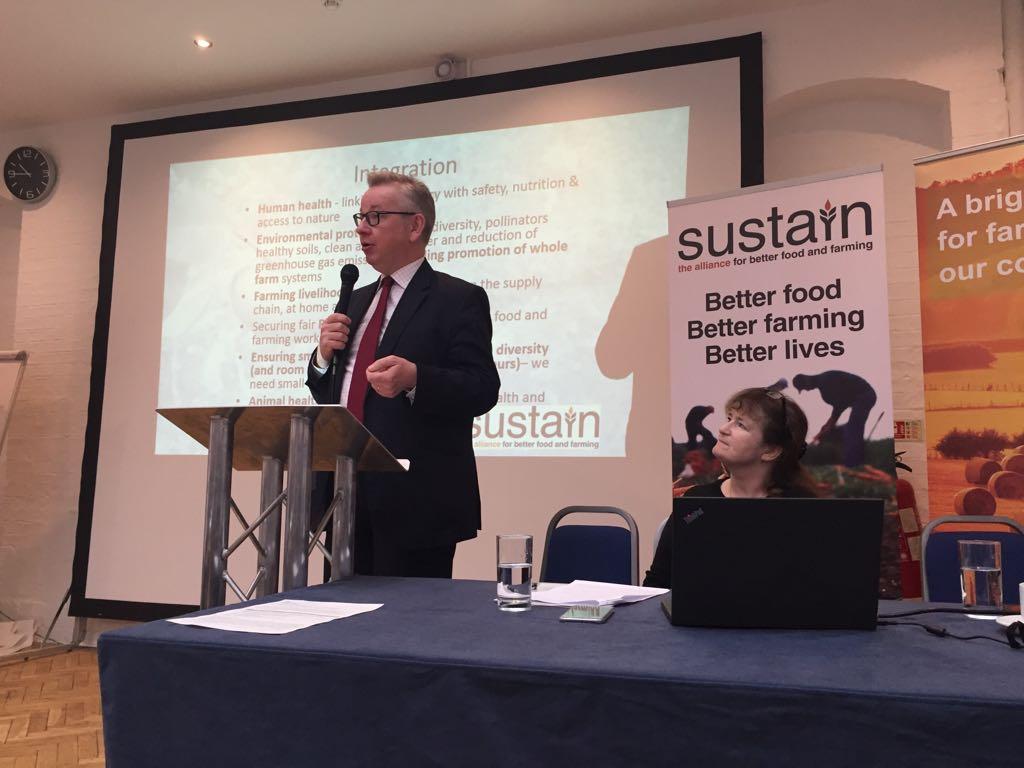Sustain • Brexit • Alliance meetings
2018, April: Defra secretary Michael Gove co-hosts farm consultation with Sustain

Michael Gove urged people to take advantage of the Defra consultation on Future Farming to 'make it clear what you want’ saying “I want a food and farming policy that reflects what the people in the country want – higher standards and better outcomes.” and noted the need to “stop it being shaped by vested interests to imprint their agenda.”
The Secretary of State also spoke of the reasons for calling the consultation paper ‘Health and Harmony’ as “we have to recognise that when we think about food production, food is ultimately about health. We produce food not to ensure that individual businesses are profitable, but we do it for human health and function. So we can live longer and more fulfilling lives and so we can all feel the benefits of health and greater connection with natural world.”
The room was packed with over 120 delegates including Sustain members and partners, farmers, farm workers, academics and practitioners were pleased to hear a strong agreement on the need for a health focus in future farm policy. Michael Gove spoke of the role for government as “Not as Nanny, but as a guide and to promote incentives and remove perverse incentives.... To identify ways we can support high quality food production that ensure what ends up on our places isn’t just a source of pleasure, but also a source of sustainable good health. And harmony – if we produce food good for us, it will also be good for the planet and the natural world and our environment.”
He noted why “Emphasis on human health is becoming more acute as we are becoming more aware of impact on food on our wellbeing and as the unique public health challenges are increasingly diet and lifestyle related. More people will die as a result of diabetes or heart disease than will die from infectious diseases.”
He spoke after Vicki Hird, Sustainable Farming Campaign Coordinator, who presented Sustain as a unique and broad alliance which aims to make all of food and farming system good, not just tinkering at the edges, to the benefit of our health, a resilient farming economy, the health of the environment and of animals. She described how the Sustain alliance sees that a more integrated approach to farm policy is vital and this is the opportunity presented to us now. There are risks but also opportunities ahead and we need to avoid the former and grasp the latter.
Vicki reflected briefly on Sustain’s past work on farm policy and how progress on environmentally friendly farming policy and practice had been exciting and farmers were on a good journey, but it feels this century as if progress stalled.
Vicki noted that things are ‘exciting again’ in this policy area – vital given the challenges ahead on trade liberalisation, climate change and food safety - but we now need a logical, coherent and efficient way of managing the farm system, supporting it and where needed regulating it as we leave the European Union.
She said “The Health and Harmony paper has some great elements not least the shift to public good approach for payments. It covers supply chain fairness and workers.
But so far, there are gaps, worrying emphases and missed chances to describe how to deliver on a broad purpose and an integrated policy – with environment and public health outcomes, with worker wages and conditions, with a supply chain that is truly fair and transparent. We also need to know that the farm budget - needed for the outcomes identified - is being safeguarded by the highest powers and that the new regulatory framework (covering farming, safety, environment, nature and animal welfare) fits the bill.
And we won’t accept the argument that this is not the role for agriculture policy. That is not good enough. Farming and food affects too much.
Of course in the creative process ahead we must always be mindful of unintended consequences. Many smaller and struggling farms should not go to the wall because we remove vital support without putting in new better ones. Equally, we must think carefully about a drive for productivity at all costs - when what we are eating, wasting, processing and exporting matters. Does it make sense to drive the soil further when we waste 30% of the food we eat.
But in the discussions today and going forward we need to avoid the negatives, the silos, the ‘cant do it because’ phrases – lets break out of those constraints and think smart and big and integrated.
Defra’s ‘Health and Harmony’ Agricultural Policy Command Paper makes a reasonable start at addressing the issues. But there is much that can be enhanced. Given that this policy will underpin how the UK farms and trades in food for a decade, we are clear that proposals are not currently strong enough, not joined up enough, not big enough in scope. We also need to have a transition phase which starts to embrace these new objectives. We want specific purpose in the final Agriculture Bill and new measures covering:
- Human health outcomes linking farm policy with safety, nutrition and access to nature tackling issues such as sugar, horticulture, and a new procurement push.
- Ambitious environmental protection for biodiversity, pollinators healthy soils, clean air, clean water and reduction of greenhouse gas emissions with far greater promotion of whole farm systems based on ecological principles like organic
- Farming livelihoods and fairness – far stronger rules on in the supply chain, at home and overseas and making it truly fair and transparent
- Securing fair pay and working conditions for food and farming workers via a new collective bargaining system.
- Ensuring small businesses can survive -and protecting farm diversity (and room for new entrants, new entrepreneurs)– we need small as well as large farm prosperity
- Animal health and welfare as a priority for health and environment objectives
And as crucial, we need to have assurance that UK trade deals actually support sustainable producers and high standards rather than undermine them. We have a draft set of comments available.”
Before inviting the Secretary of State to speak, Vicki concluded by inviting all delegates to have great discussions and detailed and powerful responses to the consultation and to encourage as many people to respond to the consultation as possible. She promoted the Sustain e-action for the general public to respond quickly and easily to the consultation.
Following the Secretary of State, Andrew Robinson, Defra Deputy Director of the Rural Development Programme Policy Team spoke about the process ahead and the details of the consultation document. He outlined some of the key areas to be discussed in the breakout groups during the day. These were:
- Reducing Direct Payments - To discuss the best approach for reducing direct payments to farmers.
- Environmental Land Management scheme - To discuss what a new environmental land management scheme should look like and how to make it a success.
- Farming Excellence, Profitability and Resilience - To discuss how to ensure farmers have access the right tools to improve productivity and manage risk and volatility
- Animal Health / Welfare - This workshop aims to explore the ways we can encourage farmers and land managers as animal keepers throughout the industry to further improve animal health and tackle endemic disease.
- Uplands and Rural - To discuss how the Government can support the uplands and other remote areas to improve growth and prosperity across rural communities
The outcomes of the sessions would be recorded and collated as contributions to the Defra Health and Harmony consultation.
Brexit: We stand at a cross-roads. When the UK leaves the European Union, will our leaders uphold good standards for our food, farming, fishing and trade deals? And will they agree a sensible deal with the EU? We need to make sure that they do!



